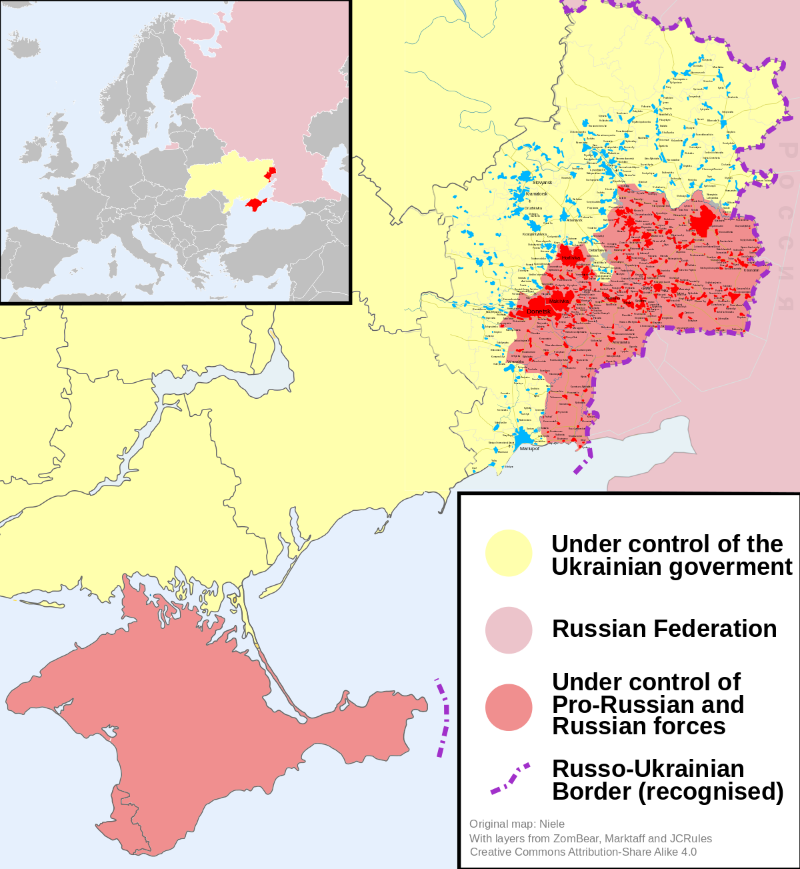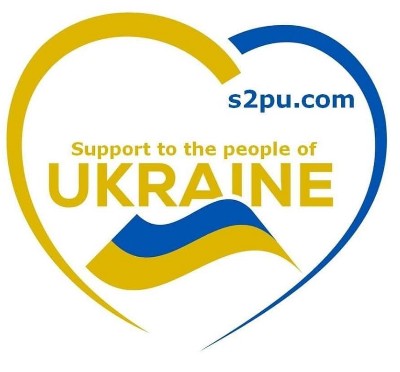Don’t call it a civil war – Ukraine’s conflict is an act of Russian aggression
As Ukraine marks 28 years since its independence from the Soviet Union, it is embroiled in the most dangerous armed conflict in Europe – against the Russian Federation. The stakes are incredibly high, and yet the war is still being discussed in euphemisms.
Dr Rory Finnin (Department of Slavonic Studies) and Dr Thomas D Grant (Faculty of Law).

(Fig: Wikipedia)
The war in Ukraine, we are often told, is a “civil war” involving “rebels” fighting the central government in Kyiv.
Too often, the crisis is talked about as if it’s entirely internal to Ukraine, a domestic affair presumably brought on by language politics, identity clashes and historical grievances. Best, therefore, to leave it alone.
Wrong. Ukraine is waging a war of self-defence against an international aggressor – the Russian Federation – whose conduct threatens our collective security. Fundamentally, this conflict was started and is sustained by Russia’s armed intervention, not a Ukrainian civic collapse. In nearly a quarter century of independence, the Ukrainian public’s support for national unity has been stronger than in many long-established states, among them Spain, Belgium and Canada. As Vladimir Putin has since proudly admitted, it was Russian troops in the spring of 2014 who seized Ukraine’s Autonomous Republic of Crimea.
Lest we forget, the purported “rebels” in eastern Ukraine agree. Here is Igor Girkin-Strelkov, a Russian national associated with Russian military intelligence who helped lead the “rebel” movement in eastern Ukraine, speaking only weeks ago: “You are making an idiot or fool of yourself if you think that [the Donetsk and Luhansk Peoples’ Republics] were formed by themselves.”
An important conclusion follows from these facts: the Russian Federation is an aggressor and should be characterised as such whenever we talk about areas of Ukraine that have fallen under the Kremlin’s effective military and political control.
There is no need to report aggression in inverted commas. Since early 2014, the Russian Federation has carried out a host of acts of aggression against Ukraine as defined in Article 3 of the UN General Assembly’s definition of aggression. Russia has invaded Ukrainian territory – Crimea, Donetsk and Luhansk so far – and attacked Ukrainian forces without a shred of plausible legal justification; bombarded Ukrainian territory and killed Ukrainian citizens; and seized territory that belongs within the internationally recognised borders of Ukraine, declaring it part of Russia. These are nothing less than acts of aggression under international law.
Nor do the sham referenda in Crimea in March 2014 or in Donetsk and Luhansk in May 2014 offer any legal wiggle room, since these “Potemkin plebiscites” resulted directly from an invasion of Ukraine by the Russian Federation.
As far as the referendums go, the UN General Assembly, the Parliamentary Assembly of the Council of Europe and the President of the OSCE Parliamentary Assembly all agree they were unlawful and illegitimate. To argue or imply that there has been an act of “self-determination” in any part of Ukraine that calls into question Ukraine’s sovereignty over its recognised territory contradicts the highest available organised expressions of international law.
If editors and journalists are substituting their own judgement of the situation, then they must explain why.
A spade’s a spade
Then there’s the matter of Ukraine’s right to self-defence, which of course is a right of all states. Russia’s aggression against Ukraine is just about the only case where a UN member state has seized and in effect sliced off whole regions of another UN member state.
In its official statements the Kremlin goes further still, repeatedly calling into question the right of Ukraine to continue in its current form, invoking a so-called “New Russia” across vast, strategic tracts of the country, and even threatening nuclear action in the wider context of the conflict.
This is not garden-variety geopolitical grandstanding. When Iraq attacked Kuwait in 1990, it was universally condemned, and Kuwait’s right of self-defence was affirmed. There is no principled reason for responding to Russia’s aggression in eastern Ukraine with different rhetoric or a different description.
It’s time to face reality. The continued escalation of the war in Ukraine poses a serious challenge to international public order. Journalists have risked everything to report events from this war, and we need to stop watering down their reports with euphemism and understatement. We need to call this what it is: a war of self-defence against an international aggressor.
This article was originally published on The Conversation. Read the original article.
